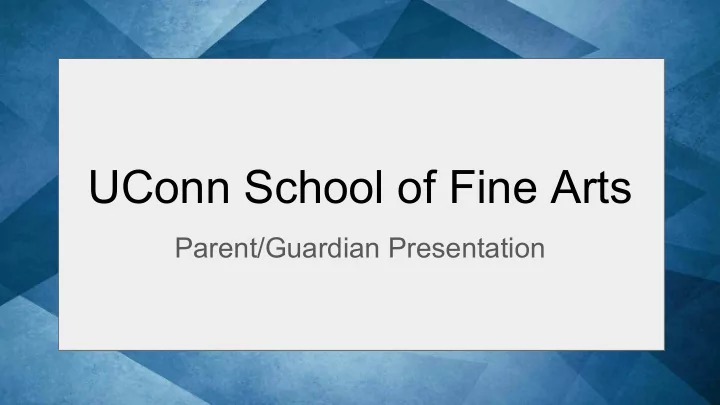

UConn School of Fine Arts Parent/Guardian Presentation
Transfer courses that can be used to meet UConn degree requirements During Orientation Advising, when selecting fall 2020 courses we will assume that this work will transfer to UConn. • ECE (Early College Experience) – UConn already has your student’s ECE course information • AP (Advanced Placement) – check with College Board (CEEB) to insure that your student had all of their test scores (junior year as well as senior year) sent to UConn. • IB (International Baccalaureate) – additional information is on the UConn Admissions website • Transfer courses from other colleges and universities. Additional information can be found in the UConn Undergraduate Catalog https://catalog.uconn.edu/
Components of your student’s undergraduate plan of study • Major requirements (plus a concentration if available) • General Education requirements • Additional degrees – if your student is planning on pursuing an additional degree, we can incorporate those requirements within their fine arts schedule • Minors – if your student is planning on declaring 1 or more minors, we can incorporate those requirements within their fine arts schedule. • Pre-professional study – pre-med, pre-dent, pre-law, etc. can be incorporated within your student’s fine arts schedule.
Components of your student’s undergraduate plan of study, cont. Descriptions of degrees and minors can be reviewed in the UConn Undergraduate Catalog https://catalog.uconn.edu/ Your student will have an Academic Requirements Report when classes begin in the fall that will track all of their degree requirements. They will be able to access it from their Student Administration system Student Center.
General Education Requirements
Writing Competency - ENGLISH 1007 (or 1010, 1011 or 2011) + two "W" (advanced writing) courses – One “W” must be in their major. Half of the first year class will enroll in ENGL 1007 in the fall 2020 semester, the other half will complete it in the spring 2021 semester. Second Language Competency – if your student has completed Level 3 or higher of in a single language in high school, they have satisfied the university’s second language competency requirement. With anything less than level 3, they will be required to complete two semesters of a single elementary language as part of their UConn degree. Quantitative Competency - Two "Q" courses must be completed – one must be a mathematics (MATH) or statistics (STAT) course. We recommend postponing registration for a “Q” course until after your student has completed their fall 2020 semester. Environmental Literacy – One three (3) credit course designated as an “E” course. Information Literacy Competency – will be fulfilled by the successful completion of ENGL 1007 (or 1010, 1011 or 2011) and a required course within their fine arts major .
Four Content Areas – Your student must pass at least six (6) credits of coursework in each of the four content areas. The courses in Content Areas One, Two and Three must come from six distinct academic subject areas . • CA.1 – Arts & Humanities • CA.2 - Social Science • CA.3 – Science & Technology (one must be a 4 credit lab course) • CA.4 – Diversity & Multiculturalism (one must be international) • Six credits from each CA in any order, from different academic departments, by the time your student graduates A comprehensive list of all content area courses are in the UConn Undergraduate Catalog https://catalog.uconn.edu/
Students must complete a minimum of 120 credits. Transfer work can be applied to the 120 credit requirement. Full-Time students typically enroll in 15-18 credits each semester. Prior to their Orientation Advising appointment, new first-year students will be automatically enrolled in their required first semester fine arts courses. During the advising session, first year students will enroll in open general education courses that fit around their required major classes. Some seats in general education courses will be reserved for specific majors. Students will use the Dynamic Class Schedule to identify seats in general education courses open to fine arts students.
Resources and Opportunities
During a student’s Orientation Advising appointment, there will be opportunities to discuss various undergraduate enrichment opportunities, including: Honors Education Abroad Internships OUR (Office of Cultural Centers Student Organizations Undergraduate Research funding) Center for Students with Learning Communities UNIV 1800 University Disabilities Learning Skills courses A complete listing of Student Resources is available in the UConn Undergraduate Catalog https://catalog.uconn.edu/
Recommend
More recommend